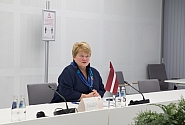
Great Britain is an important partner to Latvia, and we are very pleased that the European Union (EU) and the United Kingdom (UK) were, in a race against time, able to agree on their future relations post-Brexit, emphasised by Vita Anda Tērauda, Chair of the Saeima European Affairs Committee, on Monday, 28 December. Today, members of the Committee approved the Latvian national position on the deal on the future relations between the EU and the United Kingdom of Great Britain and Northern Ireland.
“Latvia supports the signing of the mutual agreements and the provisional application thereof from 1 January of next year until the completion of all procedures necessary for entry into force of the new procedure. We hope that the application of the agreements over the coming months will be smooth and not cause disproportionate disruptions to entrepreneurs, as well as the citizens of Latvia who have strong economic and social ties with the United Kingdom. It is important to note that all Member States need to decide on their support of the deal by 29 December. The European Parliament is to be exceptionally authorised to ratify this agreement, that is, it will not be ratified by each EU Member State separately,” noted Tērauda.
The Chair of the Saeima European Affairs Committee highlighted that the agreement aimed to address issues related to our citizens residing in the UK and to regulate healthcare and social issues. “We are glad that, among other matters, both parties were also able to agree on the coordination of social security and provision of social guarantees, for instance, on the use of the European Health Insurance Card (EHIC) by citizens of the EU travelling, working or moving to the UK, and vice-versa, starting 1 January next year,” said Tērauda.
Today, Edgars Rinkēvičs, Minister of Foreign Affairs, explained to the MPs that the deal made between the EU and the UK on 24 December included three agreements: the EU-UK Trade and Cooperation Agreement, the Agreement on Security Procedures for Exchanging and Protecting Classified Information, and the Agreement between the Government of the United Kingdom and the European Atomic Energy Community (EURATOM) for cooperation in the peaceful uses of atomic energy.
The new Trade and Cooperation Agreement will be the foundation of unprecedented trade relations in terms of access to goods and services markets, as well as considerably improved trade conditions for both parties in comparison to the conditions of the World Trade Organisation or any other free trade agreement signed by the EU thus far. The agreement stipulates zero tariffs and quotas on all goods. According to the information prepared by the Ministry of Foreign Affairs, import and export will, as with any third country, still be subject to customs formalities and border controls.
The Agreement allows for the continuation of air, road, rail and sea traffic connectivity, ensuring a high level of transport safety, employee and passenger rights, and environmental protection.
The Agreement also includes a new procedure for the management of over 100 common fish stocks found in the waters of the EU and the UK. According to the Agreement, EU fishing vessels will retain the current level of access to the UK waters during the 5.5-year transition period, gradually decreasing the EU fishing quotas in the UK waters over time. Both parties will consult each other annually to agree on further fishing opportunities.
The deal does not impose a visa requirement for short-term visits. As stated in the report of the Ministry of Foreign Affairs, long-term visits and stays will be subject to the immigration regulations of the UK and the Member States of the EU.
Though free movement of persons from the EU to the UK, and vice-versa, will be discontinued after the transition period, the Agreement foresees the coordination of mobility and social security, aimed at protecting the rights of EU citizens. It will cover a range of social security benefits and old-age pensions. Regarding health care services, the deal stipulates that residents of the EU and the UK will be able to receive urgent medical attention and planned treatment.
Additionally, a new framework will be developed for the cooperation of law enforcement institutions in criminal proceedings, particularly in countering and investigating cross-border crime and terrorism.
The deal does not cover cooperation on external relations, security and defence, as the UK refused to develop a joint legal framework for cooperation in these areas. Importantly, a Partnership Council of the EU and the UK is to be developed to monitor the implementation of the Agreement, ensuring that the Agreement is interpreted and applied precisely, and to review disputes, said Rinkēvičs.
Saeima Press Service







